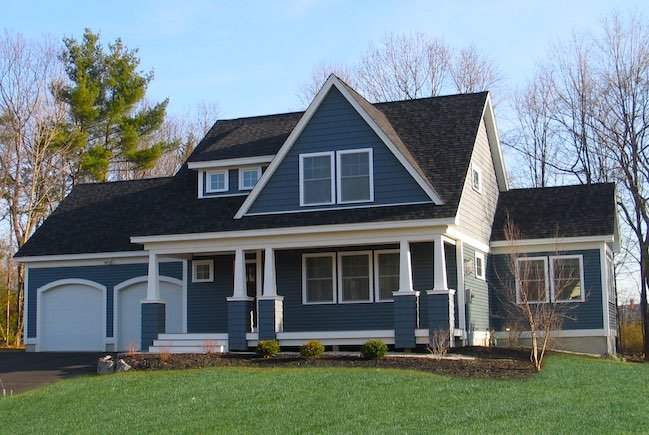Chinburg has a proven track record of navigating the complicated world of new home construction in NH.
New home construction in NH, like in most states, can be a challenging and exciting process. A new home builder needs to sort through a great deal of information – especially when trying to interpret the many zoning laws and codes within the community in which they are building. This is why it’s essential to work with an experienced home builder like Chinburg Properties, well versed in navigating NH’s building laws and codes.
In addition to compliance with the myriad residential zoning laws, a builder must also consider the general guidelines outlined in the NH State Building Code. This is a set of minimum standards determined by the NH State Building Code Review Board. A builder may also need to adhere to federal standards depending upon the type of project they are propose. The potential need for environmental and historic review also should be considered.
With such a wide slate of necessary approvals and reviews a new home build requires, not to mention the associated costs, it’s no secret that new home construction in NH can take time and become expensive. At Chinburg Properties, we recognize that this process can be confusing. So instead of leaving one to wander, we’ve attempted to compile everything a home builder needs to know about new home construction in NH and put it all in one place.
And because handling all of the intricacies involved in new home building is our profession, we feel confident that the following information can be a helpful guide for new home construction.
Let’s start at the very beginning.
Let’s assume you’ve got your piece of land picked out, you’ve selected a builder and are now just getting into the planning stages of building your new home. What happens next? The following is helpful guidance a new home builder can follow that to help throughout the building process.
Do your research
The first logical step in new home construction involves doing your due diligence and truly learning what it will take to obtain the building permit.
The process a new home builder must follow in NH first begins with the New Hampshire Building Code. If unfamiliar, here’s a refresher:
“The “New Hampshire building code” (or “state building code” or “building code of the state of New Hampshire”) is really comprised of several codes: the International Building Code 2009, the International Plumbing Code 2009, the International Mechanical Code 2009, the International Energy Conservation Code 2009, the International Residential Code 2009, the International Existing Building Code 2009, and the National Electrical Code 2011.”
If you read the law further, you’ll notice there is a section that requires a new home builder to obtain a permit before starting new construction. This permit, however, is not granted by the state. Instead, the law allows for municipalities in NH to adopt “enforcement mechanisms” that allow them to grant permits for new building projects – meaning a builder must secure approval from the town or city in which they plan to build within.
“The local legislative body may enact as an ordinance or adopt, pursuant to the procedures of RSA 675:2-4, additional provisions of the state building code for the construction, remodeling, and maintenance of all buildings and structures in the municipality, provided that such additional regulations are not less stringent than the requirements of the state building code. The local legislative body may also enact a process for the enforcement of the state building code and any additional regulations thereto, and the provisions of a nationally recognized code that are not included in and are not inconsistent with the state building code.”
If you want to know more about the authority a municipality holds over granting a permit it is all spelled out here. But in general it’s good to know that towns and cities in NH may have regulations that could be considered more stringent than state regulations. This is to preserve the property and protect a municipality’s historic integrity. Most municipalities have the process a new home builder should follow spelled out on their web sites. If they don’t, it is helpful to swing by your local town hall to inquire further.
In addition to knowing the applicable state laws, it’s important for a new home builder to understand the nature of his/her project. A good way to do this is to ask the following questions:
- What zone is my project located in?
This is an important question because it will help a new home builder determine what is expected of their project; such as what are the allowed uses, what are the setbacks and are there any open space requirements.
- Is my project in a wetland area?
If your project is in a wetland area chances are it will be subject to even more review and may need additional approvals from the state and local Conservation Commission.
- Is my project in the “Historic District” of my community?
Not all municipalities have historic districts, but many do. If your project is in a “Historic District”, this mean it could also be subject to further review by the state and will likely need approvals from your community’s historic board or commission.
The answers to these questions will undoubtedly help you tackle the next obstacle in your new home construction journey. Now that you’ve done your research, let’s get into the process of applying for that building permit.
Applying for permits
In some communities, applying for a building permit is easier than it used to be. Cities like Concord have all of their permit applications available online, while communities such as Nashua not only have all of the information a new home builder needs online, but also features a complete “How to Apply For A Building Permit” guide. Not every municipality will have this information available online – meaning you will need to pay a visit to town hall to pick them up in person.
When applying for a permit, a new home builder will need supporting documentation; such as a certified plot plan, floor plans, elevation detail etc. Depending on the scope of the work, you will most likely require that a professional architect or engineer has certified the plans. Your project may also require further review or approvals, especially if it is located near a wetland area or if it involves a certain use that is not permitted in your zoning district.
In addition to a set of certified plans, a new home builder should be prepared to pay permit fees. The permits needed will vary depending on the scope of the project, and will cost money. A city like Portsmouth has its entire building permit fees schedule available online. The cost of permits varies based on the anticipated work. A new home builder can also be charged a fee based on the square footage of their project. There are also impact fees and zoning variance fees.
After applying and paying for a permit, a builder will then have to wait a week or two for planning officials to review and sign off on the application. This will vary depending upon the completeness of an application or the amount of work needed to properly review your project.
(*Working without a permit is not only unsafe, but is against the law and can result in fines, surcharges and other penalties.)
The Review Process
If your parcel of land is not approved for development, the necessary review and approvals of land use boards is also a critical and involved step.
The size, location and use of the project could require several additional steps in the review process. If your project is in a historic district, it may need to go before the Historic District Commission or some equivalent. If it’s in a flood plain or near wetlands, it may need to go before the Conservation Commission. If the project being proposed doesn’t conform to zoning laws, it will also need to request a variance from the municipality Zoning Board.
One good suggestion we make to all new home builders is to surround themselves with professionals who can assist and/or manage the review process by presenting the project in front of the boards and commissions. These are usually the same professionals who helped draft and certify your plans.
The length of time or amount of review your project needs completely depends on its size and scope. You may need to attend multiple meetings and work sessions. Also be prepared to compromise – your project may go through various iterations throughout the review process.
The process of new home construction in NH can be time consuming. However, getting familiar with how and why the process works will go a long way in making it that much more manageable. The guidance we’ve provided above is very basic and could be even more stringent depending up on the type of project you are proposing, not to mention where it is located within your community. Once the permit is issued and the construction is completed, a new home building project will likely need final review before being granted a certificate of occupancy.
At Chinburg Properties, we understand that a builder must work within a specific framework when constructing a new home. We also understand that working your way through the approval process can be an intricate process. This is why choosing the right building professionals to help you is critical to completing your home on budget and on time.
Being a long-term home builder in NH means knowing the ins and outs of state and local laws. And as you’ve seen above, it’s also about being able to interpret the language of the codes and regulations. With more than 25 years experience in the field of building and development, Chinburg has a proven track record of navigating the often-complicated world of building in NH.
Are you considering building a custom home? If so, you might find our post Five Questions to Ask Yourself When Selecting a Custom Home Builder helpful. Ready to get started? Contact us today.


